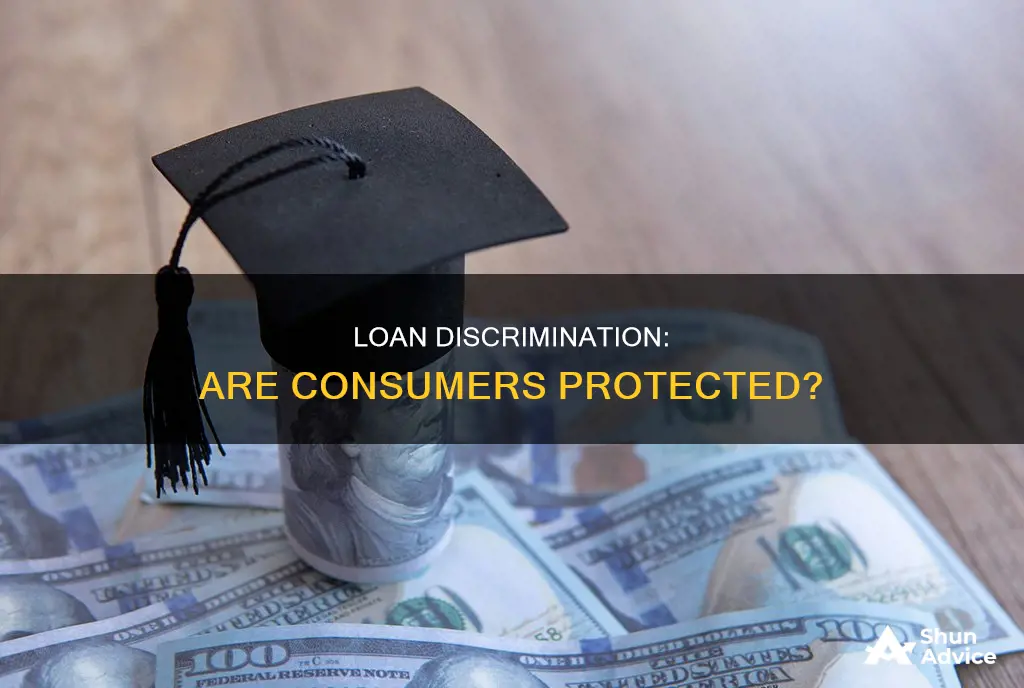
Consumers are protected against loan discrimination by various federal laws, including the Consumer Credit Protection Act, the Fair Housing Act, and the Equal Credit Opportunity Act. These laws prohibit unfair and discriminatory practices in the financial marketplace, such as credit decisions based on race, religion, age, sex, sexual orientation, gender identity, national origin, or disability. If a consumer believes they have been discriminated against by a lender, they can file a complaint with the Consumer Financial Protection Bureau (CFPB) and may even have the right to bring a lawsuit. The CFPB works to ensure fair and equitable access to credit through research, enforcement of fair lending laws, and promotion of fair lending compliance.
| Characteristics | Values |
|---|---|
| Name of the Act | Equal Credit Opportunity Act (ECOA) |
| Year of enactment | 1974 |
| Prohibited discrimination based on | Sex or marital status |
| Additional prohibitions added in | 1976 |
| Prohibitions added in 1976 | Race, color, religion, national origin, age, receipt of public assistance income, or exercising one’s rights under certain consumer protection laws |
| Protection against | Discrimination in the financial marketplace |
| Types of loans covered | Car loans, credit cards, home loans, student loans, and small business loans |
| Protection for consumers | Lenders cannot make consumers feel rushed or pressured to sign |
| Consumers have the right to receive information in writing | |
| Consumers have the right to receive reasons for denial of credit | |
| Consumers have the right to challenge discrimination by bringing a lawsuit |
What You'll Learn

The Consumer Financial Protection Bureau (CFPB)
The CFPB has jurisdiction over a wide range of financial entities, including banks, credit unions, securities firms, payday lenders, mortgage-servicing operations, foreclosure relief services, debt collectors, and for-profit colleges. It has used technology tools to monitor how these entities use social media and algorithms to target consumers.
One of the key roles of the CFPB is to enforce federal laws that protect consumers from discrimination in lending practices. This includes the Equal Credit Opportunity Act, which prohibits discrimination on the basis of race, colour, religion, national origin, sex, marital status, age, receipt of public assistance, or the good faith exercise of any rights under the Consumer Credit Protection Act. The CFPB provides consumers with tools and resources to protect themselves from discrimination and helps them understand their rights under various laws, including the Fair Housing Act and the Consumer Credit Protection Act.
The CFPB also works to make loan disclosures clearer so that consumers can understand their rights and responsibilities. For example, the bureau has created tools like Ask CFPB, which provides plain-language answers to personal finance questions, and "Paying for College", which estimates the cost of attending specific universities. Additionally, the CFPB maintains a public complaint database, which helps consumers identify problematic institutions or products.
The CFPB has faced some challenges and controversies, including legal battles over its structure and attempts by the Trump administration to dismantle it. However, court orders and injunctions have been put in place to protect the agency and its staff. The CFPB continues to work towards its goal of ensuring fair and equitable access to credit for individuals and communities through research, enforcement, and promotion of fair lending practices.
CFPB's Regulatory Scope: Private Trust Deed Loans
You may want to see also

Equal Credit Opportunity Act (ECOA)
The Equal Credit Opportunity Act (ECOA) is a landmark civil rights law that protects individuals from discrimination in all aspects of credit transactions. It is administered and enforced by the Consumer Financial Protection Bureau (CFPB), a US government agency that ensures banks, lenders, and other financial companies treat consumers fairly.
The ECOA, or Title VII of the Consumer Credit Protection Act, specifically prohibits discrimination on the basis of race, colour, religion, national origin, sex, marital status, age, receipt of public assistance, or the good faith exercise of any rights under the Consumer Credit Protection Act. This means that lenders cannot treat applicants differently based on these protected characteristics and must provide equal access to credit opportunities.
Under the ECOA, creditors are required to provide applicants, upon request, with the reasons for denying their credit applications. Additionally, the Dodd-Frank Act, which amended the ECOA, mandates that creditors supply applicants with a copy of all appraisals and other written valuations used in connection with first lien loan applications secured by a dwelling.
The ECOA is monitored by federal agencies with regulatory authority over lenders, such as the Federal Trade Commission (FTC) and the National Credit Union Association (NCUA). These agencies are responsible for ensuring creditors' compliance with the ECOA and referring potential violations to the Justice Department for further investigation and potential litigation.
If an individual believes they have been discriminated against by a lender, they can file a complaint with the CFPB. The CFPB provides tools and resources to protect consumers from discrimination and promote fair lending practices, ensuring that individuals are treated fairly and have access to the information and support they need when applying for credit.
Target Employee Loans: What's the Deal?
You may want to see also

Fair Housing Act (FHA)
The Fair Housing Act (FHA) is a federal law established in 1968 that forbids discrimination in most housing-related activities, including buying, selling, renting, or financing. The FHA was enacted to prohibit race discrimination in the sales and rentals of housing, as well as discrimination based on colour, sex, national origin, or religion. The Act has since been amended to include protections against discrimination based on disability and familial status.
The FHA is enforced at the federal level by the U.S. Department of Housing and Urban Development (HUD), which investigates complaints of housing discrimination. Individuals who believe they have been victims of illegal housing practices may file a complaint with the HUD or file their own lawsuit in federal or state court. The Department of Justice (DOJ) also brings suits on behalf of individuals based on referrals from the HUD. The DOJ's Fair Housing Testing Program seeks to uncover hidden discrimination and hold those responsible accountable.
The FHA generally covers a wide range of housing, but there are some limited exceptions. It does not apply to owner-occupied buildings with no more than four units, single-family houses sold or rented directly by the owner without an agent, and housing operated by religious organizations or private clubs that limit occupancy exclusively to their members.
In addition to the FHA, other federal civil rights laws, such as Title VI of the Civil Rights Act, Section 504 of the Rehabilitation Act, and the Americans with Disabilities Act, also prohibit discrimination in housing and community development programs and activities, particularly those assisted with HUD funding. These laws include obligations such as taking reasonable steps to ensure meaningful access to their programs and activities for persons with limited English proficiency.
The Consumer Financial Protection Bureau (CFPB) is a U.S. government agency that ensures banks, lenders, and other financial companies treat consumers fairly. The CFPB administers and enforces federal laws such as the Equal Credit Opportunity Act, which prohibits discrimination on similar grounds to the FHA, including race, colour, religion, national origin, sex, marital status, age, and receipt of public assistance.
Ameritrade Share Loans: What Investors Need to Know
You may want to see also

Consumer Credit Protection Act
The Consumer Credit Protection Act (CCPA) offers protection against credit discrimination. Credit discrimination can be hard to spot as it is often hidden or unintentional. Some red flags to look out for include being treated differently in person than on the phone or online, being encouraged to apply for a type of loan with less favourable terms, and lenders making negative comments about your race, national origin, age, sex, or other protected statuses.
The Consumer Financial Protection Bureau (CFPB) is a U.S. government agency that ensures banks, lenders, and other financial companies treat consumers fairly. The CFPB enforces federal laws such as the Equal Credit Opportunity Act, allowing consumers to challenge discrimination in credit transactions.
Tesla Loan Prepayment: Penalty or Peace of Mind?
You may want to see also

Civil rights law
The Equal Credit Opportunity Act (ECOA), a federal civil rights law, prohibits creditors from discriminating against individuals on these protected grounds. The ECOA applies to all credit transactions, including home loans, and entitles individuals to an equal opportunity to obtain credit. It requires creditors to follow specific policies and practices and provide applicants with the reasons for denying credit.
Additionally, the Fair Housing Act (FHA) bans lenders from discriminating based on race, religion, colour, national origin, sex, familial status, disability, or other protected characteristics in housing sales or loans. Both the ECOA and FHA provide statutory protections against lending discrimination, particularly in the context of mortgage lending.
If individuals believe they have been subjected to lending discrimination, they can file a complaint with the Consumer Financial Protection Bureau (CFPB) or contact the Department of Justice's Housing and Civil Enforcement Section, which enforces anti-discrimination laws. The CFPB provides tools and resources to protect individuals from discrimination and ensures fair and equitable access to credit. Individuals can also seek legal support from attorneys specialising in civil rights cases to understand their options and protect their rights.
It is important to note that credit discrimination can be hidden or unintentional, making it challenging to identify. Individuals should be aware of red flags, such as being treated differently in person than online or being encouraged to apply for loans with less favourable terms. By recognising these signs and understanding their rights under civil rights laws, individuals can challenge discriminatory lending practices and promote fair access to credit.
Botanic Gardens: Exploring Accessibility with Loaner Wheelchairs
You may want to see also
Frequently asked questions
The Equal Credit Opportunity Act is a federal civil rights law that protects consumers from discrimination in the financial marketplace. It was passed in October 1974 to address common discrimination against women applying for credit.
The ECOA prohibits credit decisions based on sex, gender identity, sexual orientation, transgender status, race, colour, religion, national origin, age, marital status, receipt of public assistance income, or the exercise of consumer protection laws.
You can file a complaint with the Consumer Financial Protection Bureau (CFPB), a US government agency that ensures banks, lenders, and financial companies treat consumers fairly. The CFPB will provide a way to monitor the status and progress of your complaint.
Credit discrimination can be hard to spot as it is often hidden or unintentional. Some red flags include being treated differently in person than on the phone or online, being encouraged to apply for a type of loan with less favourable terms, and hearing the lender make negative comments about protected characteristics such as race, age, sex, or national origin.







